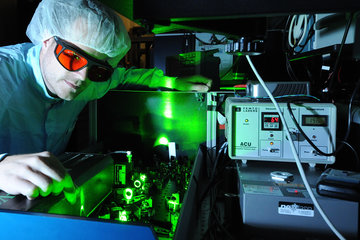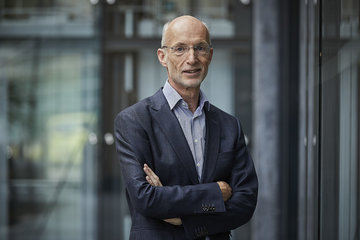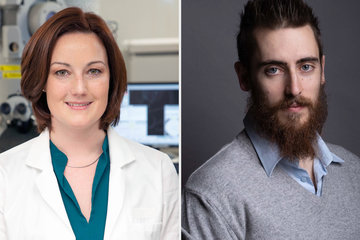Plenty of reasons to celebrate!
Ferenc Krausz was presented with the Nobel Prize in Physics on 10 December 2023 in Stockholm. This marks the Max Planck Society's sixth consecutive prize since 2020 and the 28th Nobel Prize in total since its foundation in the Kaiser Wilhelm Society (KWG).

In Sweden, December 10 is a major annual event known as “Nobeldagen”, marking the anniversary of the death of the prize donor, industrialist Alfred Nobel. Since 1901, this day has been the occasion for awarding the Nobel Prizes in Literature, Physics, Chemistry, Medicine, and Economics in Stockholm. It serves as the pinnacle of a festive week filled with concerts, receptions, and lectures by the Laureates of the year.
During a festive ceremony at the Stockholm Concert Hall, the artistically and calligraphically designed medal is presented to the honourees by the King of Sweden. Following the ceremony, a lavish banquet is held at City Hall. Many Swedish families partake in the celebrations by setting up festive tables at home. In some cases, they even serve the menu from the previous year‘s Nobel celebrations, since the order of the dishes remains a secret until the last minute.
Krausz can be seen twice via livestream
Nobel Prize Lecture
Ferenc Krausz from the Max Planck Institute of Quantum Optics will be awarded the Nobel Prize in Physics alongside Pierre Agostini from Ohio State University (USA) and Anne L'Huillier from the University of Lund (Sweden). The Nobel Committee recognizes all three for their pioneering work in establishing attosecond physics. An attosecond is the billionth part of a billionth of a second. Leveraging laser pulses lasting only a few attoseconds, they can trace the movements of individual electrons, providing fundamental insights into the behaviour of electrons in atoms, molecules, and solids. Furthermore, this research holds the potential to contribute to the development of faster electronic components.

Ferenc Krausz is currently working on medical applications, on the development of new types of blood scans that could revolutionize early-stage disease diagnosis. He will present this topic during his Nobel Lecture on December 8, addressing the Swedish public. Furthermore, on December 9, Krausz will participate as a guest in a panel discussion at the residence of the German ambassador to Sweden. Like the award ceremony on December 10, this event can also be followed online.
Krausz is the 31st Nobel Laureate affiliated with the Max Planck Society, according to the count by the Nobel Foundation. The MPG holds the second-largest number of Nobel Prizes in the natural sciences among research institutions worldwide, trailing only the University of California and surpassing Harvard University. Notably, since 2020, Max Planck researchers have received the award three years running, with double honours in two categories in 2020 and 2021. In celebration of Nobel Week, Bayerischer Rundfunk is broadcasting a series of six interviews with Max Planck laureates.
Digital story unveils insights into 31 Nobel Laureates
The Max Planck Society presents a comprehensive exploration of the subject in the new Digital Story titled "Pioneers of Science: The Nobel Laureates of the Max Planck Society." This interactive experience offers extensive information about the "Nobel System" and Nobel Week. The story spans a significant timeframe, reaching back to 1915 - Richard Willstätter received the prize in 1915 as the first researcher of the Kaiser Wilhelm Society, from which the Max Planck Society emerged in 1948.
Eight themed stories illuminate how Nobel Prize-winning research has transformed people's everyday lives and revolutionized our understanding of the world. These narratives highlight the profound impact of scientific exploration, showcasing impressive examples from the history of the Max Planck Society, such as the discovery of nuclear fission and Einstein's theory of relativity.
Updated on December, the 8th.
Acclaimed design
The design of the Digital Story received acclaim four weeks ago when it was honoured with the prestigious Red Dot Award in the best brand and communication design category. The Red Dot Design Award stands as one of the largest and most significant design competitions globally, and its label has become internationally recognized as one of the most coveted seals of quality for outstanding design.














